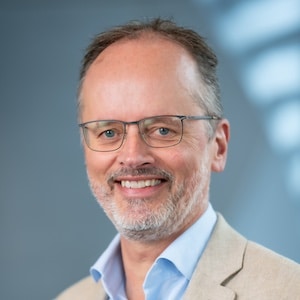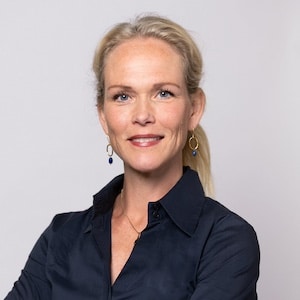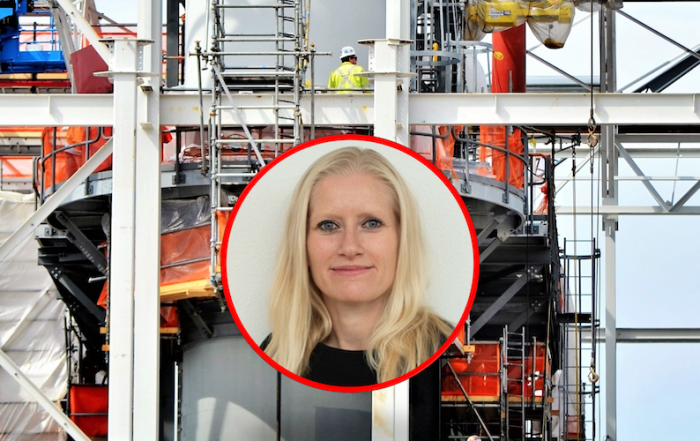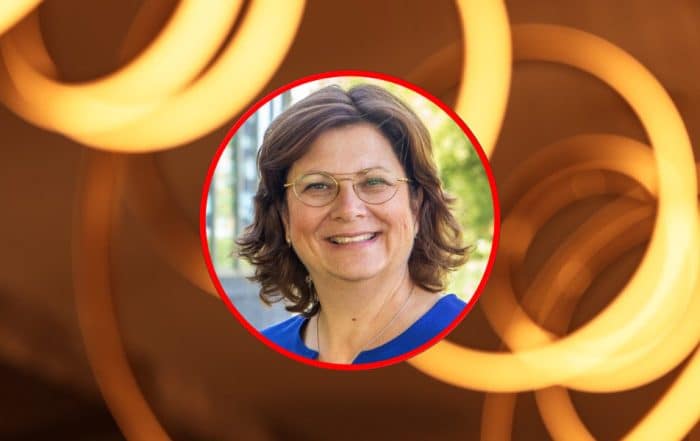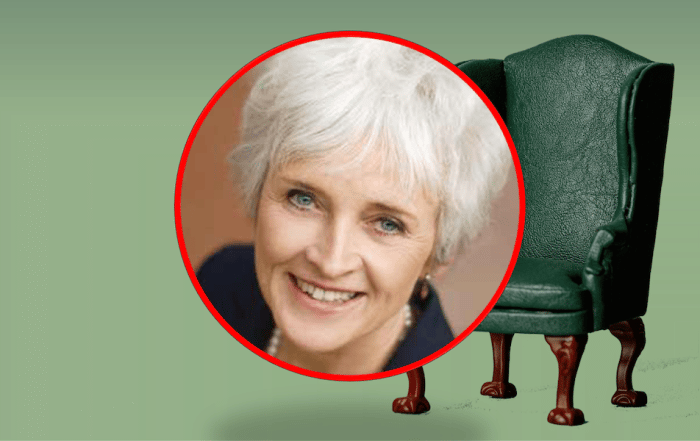Willem Offerhaus: ‘Pausing our climate efforts is not an option’
No one can do it alone. No organisation can tackle the great challenges of our time as a soloist. And that is precisely why Willem Offerhaus has operated at the intersection of government, business and education for decades. As a Board member, he contributes to the business climate in the Amsterdam Metropolitan Area and sustainable, responsible digitalisation. Both are important for a smart, green and healthy region, he argues.
No one can do it alone. No organisation can tackle the great challenges of our time as a soloist. And that is precisely why Willem Offerhaus has operated at the intersection of government, business and education for decades. As a Board member, he contributes to the business climate in the Amsterdam Metropolitan Area and sustainable, responsible digitalisation. Both are important for a smart, green and healthy region, he argues.
Want: die digitalisering raakt alle grote uitdagingen waar we als regio voor staan. Daarom is het belangrijk dat we goed nadenken over waarin we investeren, zegt Offerhaus. En dan, retorisch: “Besteden we onze ruimte en energie zinnig als we de regio volplempen met datacentra waar maar weinig mensen werken en die veel energie verbruiken?” Waarin willen we hier investeren? Waar heeft de hele regio iets aan? “Daar gaat voor mij duurzaamheid ook over. We moeten investeren in de juiste technologie, in de juiste kennisontwikkeling. En daar profiteert dan de hele regio van.”
De juiste keuzes kun je alleen maken door goed samen te werken. Offerhaus: “Bij het innovatielab in de Johan Cruijff Arena, waar een heel nieuw gebied wordt ontwikkeld, zijn allerlei partijen aan het meedenken over de digitale infrastructuur in dat gebied. Daar laten ze zien dat als je samen naar oplossingen zoekt je een enorme versnelling kunt maken. De Board kan daar ook mee helpen. Bijvoorbeeld door best practices snel beschikbaar te maken voor alle gemeenten in de Metropool.
In de carrière van Offerhaus speelde digitalisering altijd al een grote rol. Offerhaus was tot afgelopen voorjaar Executive Vice President bij KPN en ook daarvoor werkte hij bij verschillende internationale telecomorganisaties. Sinds dit jaar is Offerhaus vanuit zijn eigen bedrijf gedetacheerd bij Security Delta (HSD), waarin kennisinstellingen, bedrijven en overheden samen onze digitale maatschappij veiliger proberen te maken. Ook is hij vicevoorzitter van VNO-NCW West in de Metropool Amsterdam. Vanuit die rol is hij lid van de Board.
Als je het ondernemersklimaat in de Amsterdamse metropool een cijfer mocht geven, wat zou dat dan zijn?
“Ik zou zeggen een acht. Ons klimaat blijft aantrekkelijk. Als je ziet dat na de coronatijd de bedrijfspanden weer vol zitten, kun je moeilijk zeggen dat het slecht gaat. Op de korte termijn gaat het goed, maar we moeten wel vaart maken. We moeten goede beslissingen nemen over onze infrastructuur en woningbouw. Tegelijkertijd moeten we ondernemers helpen door de energiecrisis te komen. Voor starters op de woningmarkt is het lastig een woning te vinden, dat zie ik ook bij mijn eigen kinderen. En er is te weinig ruimte voor ondernemingen. De maakindustrie in Amsterdam-Noord heeft het moeilijk. Zij kunnen niet uitbreiden omdat de meeste grond bestemd is voor woningen en creatieve bedrijven, terwijl ze soms al decennialang daar gevestigd zijn. Ook het ov kan op veel plaatsen beter. Ik stap nu vlak bij mijn huis in de metro naar Amsterdam-Zuid om met de trein naar Laan van NOI in Den Haag te gaan. Ik doe alles met het OV en heb geen auto meer nodig. Maar niet iedereen in deze regio heeft die luxe. Investeringen in infrastructuur zijn dus ongelooflijk belangrijk.”
Welke hordes ervaren ondernemers die zelf iets aan die uitdagingen willen doen?
“Ondernemers ervaren veel regeldruk. Stikstof en de Omgevingswet vragen aandacht en vergunningstrajecten zijn niet efficiënt. De spanning op het elektriciteitsnet is nog zo’n probleem: een ondernemer die wil groeien en in de verkeerde wijk zit heeft simpelweg nog even geen toegang tot voldoende elektriciteit. Het is dus wachten op de uitbreiding van het elektriciteitsnet of totdat we energie die andere bedrijven hebben gereserveerd, maar niet gebruiken, toch kunnen benutten. Gemeenten hebben te weinig mensen in dienst om iets aan al deze uitdagingen te doen. De gemeentelijke afdelingen Kabels en leidingen zorgen voor de ondergrondse infrastructuur: energie, glasvezel, riool en andere projecten. Zo’n afdeling kan zich dus niet alleen richten op het elektriciteitsnet. Zeker niet in kleinere gemeenten. Als ze daar met een groot rioolproject bezig zijn, kom je achteraan in de rij. Dat ligt natuurlijk niet per se aan die gemeenten: er zijn overal te weinig mensen. Dat is ook het lastige aan de transities die we moeten doormaken: we hebben technische mensen nodig op alle niveaus.”
Betekent dat tekort aan mensen niet gewoon dat we sommige dingen nu even niet kunnen doen?
“De vraag is of dat een optie is. Niemand zegt: we stoppen wel even met het klimaat. Of: we wachten met glasvezel, waardoor thuiswerken niet makkelijk gaat. We moeten dus met elkaar kijken wat de beste partijen zijn om die opschaling voor elkaar te krijgen. Met de Board komen we bij elkaar en praten we over die onderwerpen. Daar zit denkkracht en kunnen we grote partijen aan initiatieven verbinden. Maar er zit bij ons geen executiekracht. Die zit bijvoorbeeld wel bij House of Skills (een programma van Amsterdam Economic Board, dat werkt aan een op skills gerichte arbeidsmarkt, red.). Die willen duizenden mensen omscholen van de ene job naar de andere. Dan heb je het over schaal. We hebben in onze regio een beroepsbevolking van 1,6 miljoen mensen. Die hebben we allemaal nodig.”
Hoe kan de samenwerking met ROM InWest bijdragen aan de benodigde innovatieve doorbraken?
“Ik ben heel blij dat ROM InWest er is. Er zijn ontzettend veel goede plannen en initiatieven maar voor sommige is niet meteen een sluitend businessmodel. Daar zijn grote investeringen voor nodig en het bedrijfsleven is vaak voorzichtig. Met de ROM kun je zo’n start wél maken. Ik vind het heel goed dat ze in Haarlem in De Koepel zijn gaan zitten. Daar is een mooi en innovatief ecosysteem. En bovendien: de Metropool is groter dan Amsterdam alleen.”
“ROM InWest richt zich op initiatieven rondom technologie en innovatie, die meehelpen met die grote transities. Die innovatie moeten we blijven ondersteunen. Ik heb vijf jaar in Boston gewoond. Dat was toen ook echt een innovatiehub, sterker dan de Bay Area rond San Francisco. Daar zat veel groeivermogen en concurrentiekracht en dat kwam ook doordat bedrijven risico’s durfden te nemen. Als het niet lukt, gaan ze, hop door naar het volgende. Maar om dat te kunnen is wel een gezond investeringsklimaat nodig.”
VNO-NCW streeft naar een inclusief en duurzaam Nederland, waar iedereen profiteert van toenemende welvaart. Daar is duurzame economische groei voor nodig en een goed ondernemingsklimaat, zo schrijft de werkgeversorganisatie op de eigen website.
Hoe kijk jij naar groeiende populariteit van de degrowth-beweging, die zegt dat economische groei niet langer het streven moet zijn?
“Ik denk niet dat daar de oplossing ligt. Het verdienvermogen van het bedrijfsleven is nodig om te werken aan de grote uitdagingen van deze tijd. Er zijn investeringen nodig en als er geen groei is, waarom zou iemand dan geld stoppen in een bedrijf? Daarnaast wordt ons leven veel duurder, dus moet ons inkomen ook groeien. We moeten die groei alleen wel op een duurzame manier voor elkaar krijgen. We moeten nadenken over hoe we produceren, hoe we inkopen. De donuteconomie (een welvaartsmodel dat de gemeente Amsterdam ook gebruikt, red.) geeft daar inhoud aan: dat kijkt naar de sociale ondergrens en de maatschappelijke bovengrens. Zo verminderen we de druk op het milieu en de leefomgeving. Maar daar is weer innovatie voor nodig, waar bedrijven geld voor vrij moeten maken.”
“Het verdienvermogen van het bedrijfsleven is ook belangrijk voor de brede welvaart. Als we groeien, kunnen we bovendien blijven werken aan een samenleving waarin iedereen gelijke kansen heeft en zich kan ontwikkelen. Dat is niet alleen vanuit het gelijkheidsideaal belangrijk — vanuit de notie dat ieder mens daar recht op heeft — maar ook vanuit economisch perspectief. Als niet iedereen meedoet, heeft dat ook effect op je beroepsbevolking.”
Op de korte termijn staan we er als regio best goed voor, zeg je. Voor de langere termijn moeten we nu aan de slag met de grote uitdagingen van deze tijd. Ben je eigenlijk hoopvol gestemd over die uitdagingen?
“Zeker. Ik heb in verschillende platformen veel met jonge ondernemers gewerkt, met innovatiehubs. Mensen die met steun van de universiteit een bedrijf hebben gestart. Daar zitten veel mooie innovaties tussen, bijvoorbeeld rondom augmented reality en virtual reality. Veel problemen kunnen we volgens mij in de virtuele wereld oplossen. Om dat voor elkaar te krijgen, is innovatiekracht nodig. Daar hebben wij de juiste universiteiten voor. Onze uitdaging is dat we die slimme mensen hier houden. Dat we vol gaan investeren in die opschaling en zorgen voor een prettig vestigings- en leefklimaat in onze regio.”
Text: Mirjam Streefkerk
More Board Talk
The interview with Willem Offerhaus is part 21 in the Board Talk series. In it, we talk to Board members about the biggest challenges facing the Amsterdam metropolis. A region that offers a sustainable, healthy living environment, responsible digitalisation and valuable work for all. These are also key themes for the Amsterdam Economic Board. Also read the other interviews in the Board Talk series.
24 October 2022
Read more about
Contact us
Want to keep up to date?
Get the best regional news and events (in Dutch) via the Board Update newsletter
Share this news
Want to keep informed?
Follow us daily on LinkedIn and sign up for the Board Update newsletter.
Read more
- What AI applications are we already deploying for healthcare and wellbeing? What ...
- Adyen is one of the great success stories of Amsterdam’s tech ...
- Together with enthusiastic partners in three coalitions, the Amsterdam Economic Board is ...

